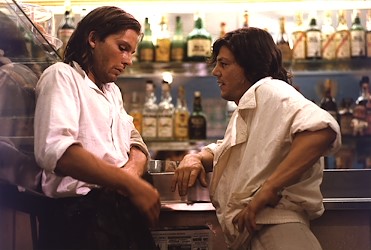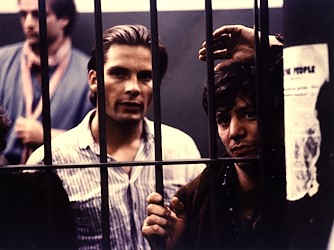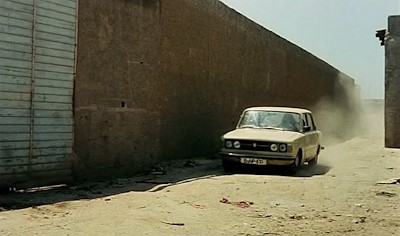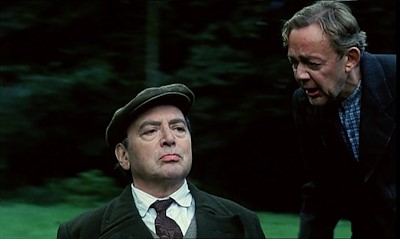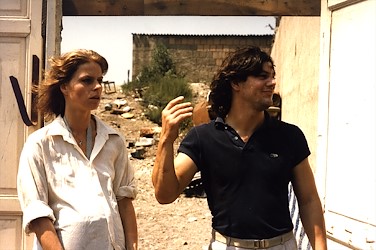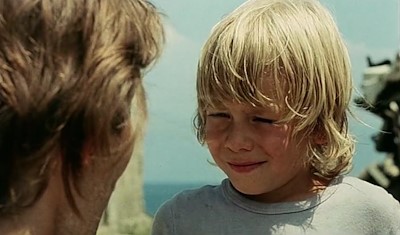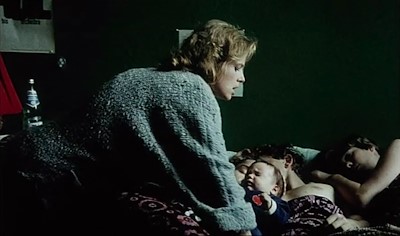Die Reise
Markus Imhoof, Allemagne, Suisse, 1986o
Dans son essai inachevé Die Reise (Le voyage), dont la plus grande partie a été écrite en 1969 mais n'a été éditée qu'en 1977, l'éditeur et auteur allemand Bernward Vesper décrit sa carrière, typique de la génération 1968, du fils autoritaire d'un écrivain nazi à la lutte pour une position indépendante et la radicalisation dans le mouvement étudiant des années 1960 aux côtés de Gudrun Ensslin future terroriste de la RAF. L'adaptation cinématographique libre du texte par Markus Imhoof prend l'enlèvement du petit fils d'Ensslin et de Vesper d’un camp terroriste sicilien et la fuite sauvage avec le père vers Berlin comme structure narrative pour un montage associatif dans lequel les stations de vie de Vesper et Ensslin (appelées autrement dans le film) sont mises en lumière.
It is astonishing that a Swiss director succeeded in creating one of the most conclusive and atmospheric portrayals of the German generation of 68 and its terrorist aberrations. With a bold trick, Markus Imhoof takes the title of Bernward Vesper's autobiographical fragment "The Journey" at its word and takes Vesper's defection from his former partner Gudrun Ensslin and from the Red Army faction's propensity to violence as the dramaturgical guideline of an exciting narrative: The kidnapping of the little son from a preparatory camp for terrorists and the chaotic journey via Berlin back to his parents' house, where the whole disaster began, form the framework for an associative montage of flashbacks wchich cicle around the fights with the authoritarian father and are contrasted by Bernwards chaotic but caring relationship with his own son. Hans Liechti's camera work risks darkness and grain and gains in atmospheric density with each of the well thought-out shots. The set design and the cast, hardly known except for a few exceptions, contribute to the authenticity of the depicted environment. The film makes its point in a powerful way: The specific German path from the students' rebellion to terrorism was shaped by the omnipresence of old Nazis. High time for the rediscovery of this film, which stands in line with Imhoof's famous Swiss refugee drama Das Boot ist voll.
Andreas FurlerThose who admired Markus Imhoof’s «The Boat is full» (1980) will not be disappointed by his honest and conscientious approach to German postwar father-son conflicts that led to the student rebellion of 1968 and the hysteria surrounding the Baader-Meinhof Group, as depicted in his well-researched film adaption of Bernward Vesper’s «The Journey».
nnImhoof schafft es, den schwierigen Weg einer rebellierenden Generation mit erstaunlicher Differenziertheit nachzuzeichnen, ohne dabei gross ins Wanken zu kommen. Wenn Vossens Knabe am Ende den ihm davontragenden Polizisten in die Hand beisst, so gefriert in einem letzten Bild die Hoffnung, dass die Kinder endlich einmal frei werden können, von den Schulden, die ihnen ihre Väter hinterlassen haben.
nnGalerie photoso

